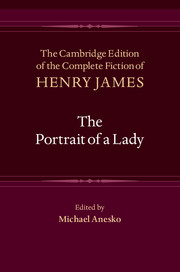Book contents
- Frontmatter
- Contents
- List of Illustrations
- Acknowledgments
- List of Abbreviations
- General Editors’ Preface
- General Chronology of James’s Life and Writings
- Introduction
- Textual Introduction
- Chronology of Composition and Production
- Bibliography
- The Portrait of a Lady
- Glossary of Foreign Words and Phrases
- Notes
- Textual Variants
- Emendations
- Appendices
Chapter 41
Published online by Cambridge University Press: 11 April 2021
- Frontmatter
- Contents
- List of Illustrations
- Acknowledgments
- List of Abbreviations
- General Editors’ Preface
- General Chronology of James’s Life and Writings
- Introduction
- Textual Introduction
- Chronology of Composition and Production
- Bibliography
- The Portrait of a Lady
- Glossary of Foreign Words and Phrases
- Notes
- Textual Variants
- Emendations
- Appendices
Summary
OSMOND touched on this matter that evening for the first time; coming very late into the drawing-room, where she was sitting alone. They had spent the evening at home, and Pansy had gone to bed; he himself had been sitting since dinner in a small apartment in which he had arranged his books and which he called his study. At ten o’clock Lord Warburton had come in, as he always did when he knew from Isabel that she was to be at home; he was going somewhere else, and he sat for half-an-hour. Isabel, after asking him for news of Ralph, said very little to him, on purpose; she wished him to talk with the young girl. She pretended to read; she even went after a little to the piano; she asked herself whether she might not leave the room. She had come little by little to think well of the idea of Pansy's becoming the wife of the master of beautiful Lockleigh, though at first it had not presented itself in a manner to excite her enthusiasm. Madame Merle, that afternoon, had applied the match to an accumulation of inflammable material. When Isabel was unhappy, she always looked about her—partly from impulse and partly by theory—for some form of exertion. She could never rid herself of the conviction that unhappiness was a state of disease; it was suffering as opposed to action. To act, to do something—it hardly mattered what—would therefore be an escape, perhaps in some degree a remedy. Besides, she wished to convince herself that she had done everything possible to content her husband; she was determined not to be haunted by images of a flat want of zeal. It would please him greatly to see Pansy married to an English nobleman, and justly please him, since this nobleman was such a fine fellow. It seemed to Isabel that if she could make it her duty to bring about such an event, she should play the part of a good wife. She wanted to be that; she wanted to be able to believe, sincerely, that she had been that.
- Type
- Chapter
- Information
- The Portrait of a Lady , pp. 400 - 407Publisher: Cambridge University PressPrint publication year: 2016

